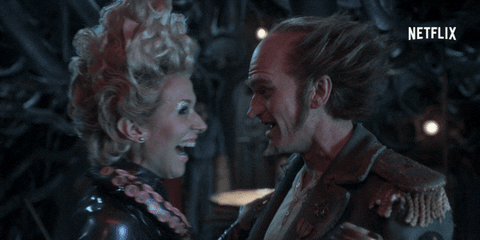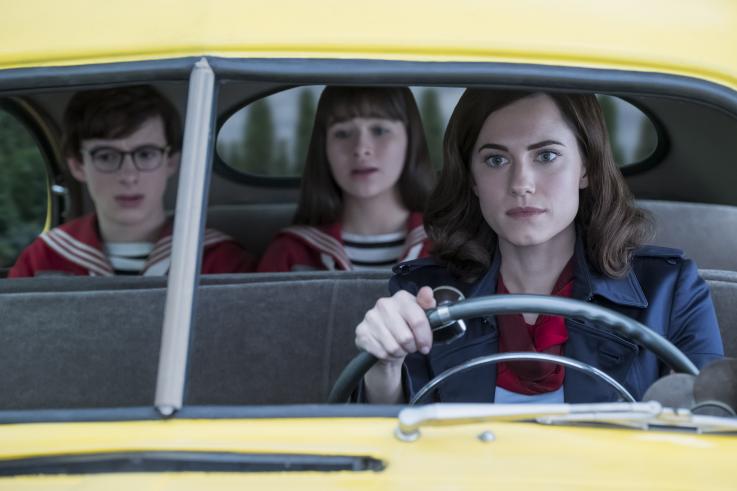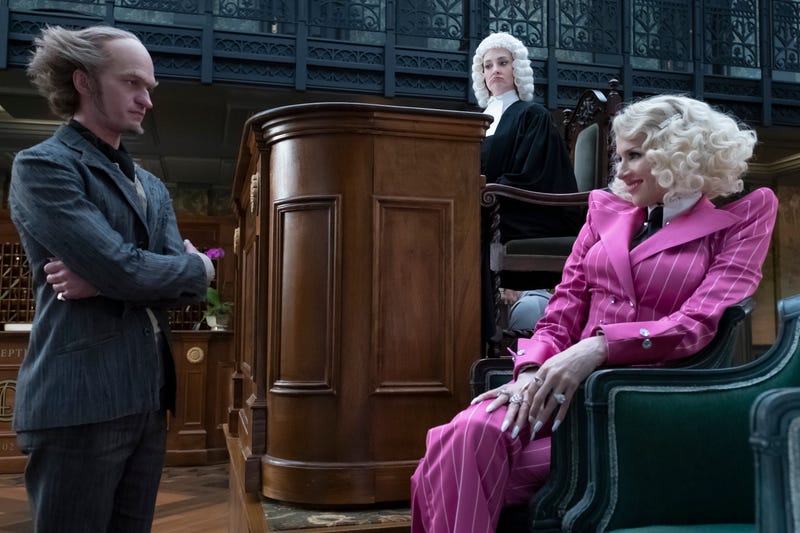Warning: This article contains spoilers for the whole series
If you’ve been paying attention, you’ll remember that Lemony Snicket has been warning us since the very first episode, and at the beginning of every episode, that this story does not have a happy ending.
Suffice to say… it finally delivered.

The Verdict
Season three was a surprisingly good wrap-up. Providing conclusions, backstories, justifications and resolutions – all of which, answered almost every running thread in the story. Though, was it satisfying?
Well, that’s up to interpretation.
I covered season two last April, praising new characters Esme Squalor and Carmelita Spats, while also giving kudos where it was due: in set design and the magnificent performances of its cast.
These are still very strong in season three. Still very reminiscent of a Wes Anderson movie in its chromatic colorizations beset in this murky, hopeless backdrop.
However, there wasn’t anything all too novel this season. No stand out moments. No ridiculous musical numbers like chasing your schemes, or kooky Olaf disguises, or over-the-top fabricated backstory. The Neil Patrick Harris talent showcase was minimized this season in order to rush to the finish line. There was also a lot less comedy than the previous seasons. Which was at times, difficult to watch.
This was the first time I didn’t binge through the series. Not because it’s bad by any means, but because it’s sad – and incredibly tragic. Let me be clear: there are very few happy moments to watch this season. If there are, it’s usually fleeting, and sense of a payoff grows dire as the remaining episode count grows short up to the finale.
The show undoes its own established formula of: Olaf, scheming, and witty escape – usually with some tragic hero falling along the way. This season the show does away with that. All for the sake of growth, but also, to give us answers we desperately needed and bring the series to a close.
Yes, there were major revelations. The history behind the origins of the VFD, what happened at the opera house, the introduction of the mycelium that serves as the series own weapon-of-mass-destruction, the reveal of Lemony Snicket’s backstory, and why exactly it is that he’s gone to all this effort to tell the tale. We even get a reveal about what is the sugar bowl, something not even the book readers got privy to up until now.
But there was just so much tragedy and finality as well that it was hard to watch without feeling sad. Especially for a series felt like it was about to hit its stride – only to wrap up and conclude.
Now if you’re a fan of the books, you’ve known this was coming. If you’re like me, who’s entered this series mostly through Netflix series, expect the sad feelings as everything sort of ties together and equally falls apart.
You can say I’ve grown attached to these characters, and I feel… almost punished for it. And now that it’s all finished, I’m feeling sort of ambivalent about writing this. The more I think about it, the more I see everything was rather pointless and tragic – with few concrete motivations but plenty of concrete Easter eggs.
But that was also sort of the point of the story. Let me explain. Final warning about spoilers.
Series Finale
In the final season, we learn Lemony’s backstory. How he was in love with the Baudelaire children’s mother: Beatrice. How she ‘accidentally’ murdered Olaf’s father at the Opera house while trying to steal the sugar bowl. How Lemony took the blame, leading to his life on the lam.
Olaf, disheartened from the events, turned to evil – leading to the path of hatred against the Baudelaire family – especially Beatrice’s children. Esme also turned to evil, who mostly just wanted her sugar bowl back as it was something that completed her tea set – again, she’s quite obsessive with the ideas of perfection.
The sugar bowl is also revealed to be the cause of the schism in VFD – as people in the organization had varying opinions on the bowl’s use – though everyone valued its pricelessness due to what was inside.
Which is revealed in the show and not the book series. The bowl’s contents is revealed to be… sugar. Though sugar laced with inoculation towards the Medusoid Mycelium: the deadliest spores/mushrooms in the world – whose spreading could effectually kill billions.
Except that it would not. Because we also learn from the season’s events, an easily accessible cure for the mushroom comes from horseradish (or wasabi, so my guess is anything spicy) or even… apples.
Yep. The deadliest world-ending weapon in the series can be cured with some everyday food.
This was done on purpose. As the series cares so much about mystery, research and allegory. It’s a series obsessed with puzzle solving and finding the truth with a capital T… yet, we’ve now also learned, time and time again in the series, that finding that the truth means very little. Especially, in a world run by absurdity.
The VFD is literally fighting over nothing. Yet only we, the audience, realize this. So again, it’s sort of pointless which is also sort of the point. That fighting between groups can often be quite meaningless.
The End

At the end, Lemony is finally caught by the person following him: Beatrice Baudelaire, his niece – now a pre-teen. Lemony’s sister, Kit Snicket – who also happened to play hero/mentor to the Baudelaire children this season – gave birth to Beatrice before her own death, and the Baudelaires adopted her and named her after mother.
The meet to recap the series of events leading up to the present – Beatrice going even further beyond, implying that she, Sunny, Violet and Klaus went on to have many more adventures.
Seriously, Why? Why!?
One of the things that makes the series compelling is how headstrong its characters are. That authority figures in power refuse to listen, or better yet, are playing for the wrong side – like in the case of the supreme judges overlooking Olaf’s trial – who turned out to be Olaf’s ‘pseudo’ parents.
We learn in the finale, that the VFD was always about picking sides. That there is no right or wrong. No good or evil. It’s all just one organization turned fractured – with people of varying moral compasses and different self-interests.
Now author Daniel Handler’s original intent was never to provide answers but to allow readers to find solutions to what they’re looking for. The series being so meta, with so many self-references to VFD and JS and the sugar bowl – that you’d need to pay attention to almost every detail. Leave no stone unturned. Reddit every thread.
But more than anything you’d have to buy into the absurdity of this world and how everyone ignores facts to fit their agenda. Which hits a little close to home in today’s America, which is also why I find the series depressing.
What also makes it work is that nobody listens to the Baudelaire children. At least, not until the penultimate episode before the finale, featuring the trial of Count Olaf.

And while the scene is heartwarming, it’s all razzmatazz. A spectacle that makes you feel for all the people leading to the moment of justice – which ultimately, is also proven fruitless.
Which of course leads to the hotel fire. The moment we must now accept that there are no good guys. I mention this because this is where everyone breaks. Olaf creates a fire with the help of the children, all with the intention of escaping unharmed. Justice Strauss provides the option to obey the law… but given everything, they’ve come to accept – there is no justice in this world.
Which inevitably leads to the fire – one that destroys a lot of the people we’ve gotten to know in the series… though we’re not entirely sure. As during the children’s and Olaf’s departure – almost every character we’ve interacted with in the series is left with is warned and forced to make a choice of how to leave… whether they all make it though, was entirely up to them.
The Final Verdict
It’s a bleak ending with resolutions that don’t satisfy me personally. Mostly, I still feel traumatized by the experience. But if you’re in for the journey. The allegories, wordsmithery and references to classical works of literature – you’re in good company. This show has packed plenty of that. Especially, within season three. It’s all just very sad. And tragic in a way.
Still, I find it all slightly strange… This whole time Olaf wanted the Baudelaire fortune – when he could’ve just been wealthy marrying, Esme. I would have.
‘A Series Of Unfortunate Events’ is available on Netflix

you found the show sad then read the books and the show will feel like a happy, beautiful and just ending..
Haha, I absolutely hear you. I heard that the show’s version had a much happier payoff than the book series.